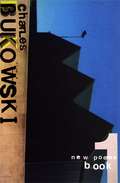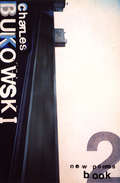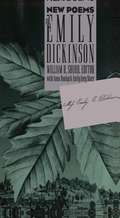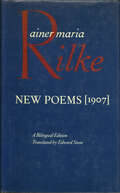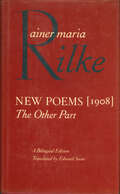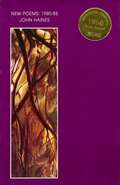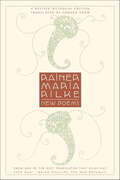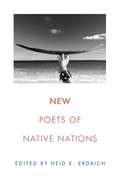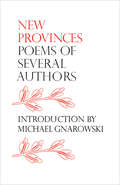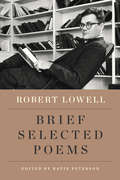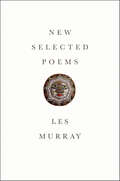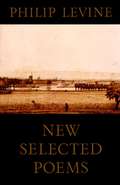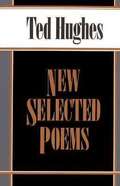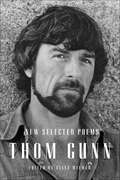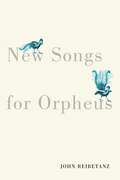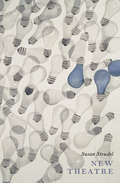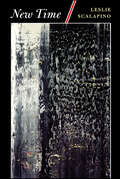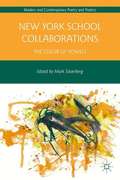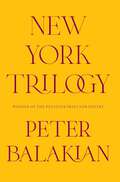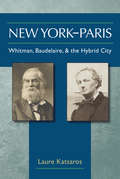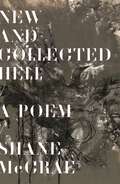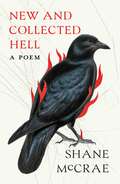- Table View
- List View
New Poems Book One
by Charles BukowskiCharles Bukowski was one of America's best-known writers and one of its most influential and imitated poets. Although he published over 45 books of poetry, hundreds of his poems were kept by him and his publisher for posthumous publication, This is the first collection of these unique poems.
New Poems Book Two
by Charles BukowskiCharles Bukowski was one of America's best-known writers abnd one of its most influential and imitated poets. Although he published over 45 books of poetry, hundreds of his poems were kept by him and his publisher for posthumous publication, This is the first collection of these unique poems, which Bukowski considered to be among his best work.
New Poems of Emily Dickinson
by William H. ShurrFor most of her life Emily Dickinson regularly embedded poems, disguised as prose, in her lively and thoughtful letters. Although many critics have commented on the poetic quality of Dickinson's letters, William Shurr is the first to draw fully developed poems from them. In this remarkable volume, he presents nearly 500 new poems that he and his associates excavated from her correspondence, thereby expanding the canon of Dickinson's known poems by almost one-third and making a remarkable addition to the study of American literature. Here are new riddles and epigrams, as well as longer lyrics that have never been seen as poems before. While Shurr has reformatted passages from the letters as poetry, a practice Dickinson herself occasionally followed, no words, punctuation, or spellings have been changed. Shurr points out that these new verses have much in common with Dickinson's well-known poems: they have her typical punctuation (especially the characteristic dashes and capitalizations); they use her preferred hymn or ballad meters; and they continue her search for new and unusual rhymes. Most of all, these poems continue Dickinson's remarkable experiments in extending the boundaries of poetry and human sensibility.
New Poems, 1907
by Rainer Maria RilkeRainer Maria Rilke's move to Paris in 1902 and his close association with Rodin led him to take a new direction in his poetry. Between 1906 and 1908 he produced a torrent of brilliant work that was published in two separate volumes under the title Neue Gedichte, or New Poems. As the celebrated Rilke translator Edward Snow observes, these books "together constitute one of the great instances of the lyric quest for objective experience." Here is the first volume, New Poems, 1907, in a bilingual edition.
New Poems, 1908: The Other Part
by Rainer Maria RilkeIn 1984 Edward Snow won the Harold Morton Landon Translation Award of the Academy of American Poets for the first volume of these translations of Rainer Maria Rilke's watershed work, NEW POEMS, 1907. His work was praised for the resonance of the English and its faithfulness to the density and meaning of the German. Like the poems in the first volume, these are presentations of objects, "thing-poems" (Dinggedichte). In 1902 Rilke left Germany for Paris where he acted as the secretary to the sculptor Auguste Rodin. Rodin's craftsman-like approach, his steady discipline, and his relentless productivity inspired in Rilke a new poetic method: he, too would be a craftsman meticulously appropriating the world about him for his poetic vision. "Somehow," he wrote, "I too must come to make things; not plastic, but written things--realities that emerge from handiwork. Somehow I too must discover the smallest basic element, the cell of my art, the tangible immaterial means of representation for everything."Until this volume, Rilke's voice had come from the interior, expressing feelings and moods. Though always celebrated for his mastery of word-sound, rhythm, meter, and rhyme, Rilke had written poetry often married by sentimentality and insularity. NEW POEMS represented a turning point, an intoxication from the materiality of the world.NEW POEMS, 1908 contains such famous works as "Archaic Torso of Apollo," "Corpse Washing," "Buddha in Glory," and "Late Autumn in Venice." Rilke takes familiar figures--from a sundial to a stained-glass Adam and Eve--and refracts their presence into corporeality and spirituality. Rilke peers behind sculptural surfaces to the implicit desire or pain in the objects of our environment.
New Poems: 1980-88
by John HainesFrom the back cover: "If one views Haines' poetic development as a journey from the specific geography of the Alaskan wilderness to the uncharted places of the spirit, then that journey is now complete." -Dana Cioia from the Introduction. "This is a magnificent book, bearing out what many of us have believed for years: that John Haines is a great poet. Thoughtful, lyrical, passionately serious, these poems represent a man in his wise maturity, giving full weight and measure to every line he utters." -Carolyn Kizer "A fine book. Haines' vision cuts through to essentials - his stern yet exhilarating poems deserve to be widely read." -Frederick Morgan NEW POEMS: 1980-88, winner of the 1990 Western States Book Award for poetry, is the tenth volume of verse by John Haines. A former recipient of an Alaska State council on the Arts Fellowship, an Ingram Merrill Foundation Grant, and a National Endowment for the Arts Fellowship, Haines has homesteaded in Alaska for more than a quarter of a century. For the last two years, he has served as a Guest Writer in Residence at Ohio University.
New Poems: A Revised Bilingual Edition (Studies In German Literature Linguistics And Culture Ser. #164)
by Rainer Maria RilkeThe formative work of the legendary twentieth-century poet who sought to write “not feelings but things I had felt,” featuring his poems in German and English.When Rainer Maria Rilke first arrived in Paris in September 1902, commissioned by a German publisher to write a monograph on Rodin, he was twenty-seven and already the author of nine books of poems. As accomplished as his early work had been, it belonged tonally to the impressionistic, feeling-centered world of a late-nineteenth-century aesthetic.Paris was to change everything. Rilke’s interest in Rodin deepened, and his enthusiasm for the sculptor’s “art of living surfaces” set the course for his own pursuit of an objective ideal. What was “new” about Rilke’s New Poems, published in two independent volumes in 1907 and 1908, was a compression of statement and a movement away from “expression” and toward “making realities.” Poems such as “The Panther” and “Archaic Torso of Apollo” are among the most successful and famous results of Rilke’s impulse.The translations in these selections from the companion volumes have been substantially revised by award-winning translator Edward Snow.“Rilke’s first great work. . . . [Snow’s translation] is clear, accurate, and fluent.” —Stephen Mitchell
New Poets of Native Nations
by Heid E. ErdrichA landmark anthology celebrating twenty-one Native poets first published in the twenty-first centuryNew Poets of Native Nations gathers poets of diverse ages, styles, languages, and tribal affiliations to present the extraordinary range and power of new Native poetry. Heid E. Erdrich has selected twenty-one poets whose first books were published after the year 2000 to highlight the exciting works coming up after Joy Harjo and Sherman Alexie. Collected here are poems of great breadth—long narratives, political outcries, experimental works, and traditional lyrics—and the result is an essential anthology of some of the best poets writing now.Poets included are Tacey M. Atsitty, Trevino L. Brings Plenty, Julian Talamantez Brolaski, Laura Da’, Natalie Diaz, Jennifer Elise Foerster, Eric Gansworth, Gordon Henry, Jr., Sy Hoahwah, LeAnne Howe, Layli Long Soldier, Janet McAdams, Brandy Nalani McDougall, Margaret Noodin, dg okpik, Craig Santos Perez, Tommy Pico, Cedar Sigo, M. L. Smoker, Gwen Westerman, and Karenne Wood.
New Provinces: Poems of Several Authors
by Douglas Lochhead Michael GnarkowskiWhen New Provinces first appeared in 1936, it represented four years of planning, argument, and compromise, and an additional two and a half years of correspondence and editorial preparation. This prolonged effort was brought to a successful end with the publication of a slim collection of verse, the work of six writers, Robert Finch, Leo Kennedy, A.M. Klein, E.J. Pratt, F.R. Scott, and A.J.M. Smith. At the time it was published it received little critical attention and had even less popular appeal; after nearly a year the book had sold only 82 copies, 10 of them to one of the contributors. Only E.K. Brown, writing for University of Toronto Quarterly in 1937, seemed to realize that New Provinces 'marked the emergence ... of a group of poets who may well have a vivifying effect on Canadian poetry.' Since that time this small volume has been recognized as a monument in Canadian literature, a singular event in a literary process which stemmed from the origins of Canadian modernism and its beginnings in Montreal, marking the first collective effort to introduce poets who came to represent the new establishment. Michael Gnarowski's introduction tells the fascinating story of the genesis of the idea for the book and the difficulties that were encountered.
New Selected Poems
by Robert Lowell Katie PetersonIn this condensed edition of Selected Poems, Robert Lowell’s poems are brought together from all of his books of verse. Chosen and introduced by Katie Peterson on the occasion of Robert Lowell’s one hundredth birthday, Brief Selected Poems offers a perfectly chosen and illuminating representation of one of the great careers in twentieth-century poetry.
New Selected Poems
by Les MurrayA fresh selection of the finest poems—some previously uncollected—by one of our finest English-language poetsWhy write poetry? For the weird unemployment.For the painless headaches, that must be tapped to strikedown along your writing arm at the accumulated moment.For the adjustments after, aligning facets in a verbbefore the trance leaves you. For working always beyondyour own intelligence. —from "The Instrument"New Selected Poems contains Les Murray's own gathering from the full range of his poetry—from the 1960s through Taller When Prone (2004) and including previously uncollected work. One of the finest poets writing today, Murray reinvents himself with each new collection. Whether writing about the indignities of childhood or the depths of depression, or evoking the rhythms of the natural world; whether writing in a sharply rendered Australian vernacular or a perfectly pitched King's English, his versatility and vitality are a constant. New Selected Poems is the poet's choice of his essential works: an indispensable collection for readers who already love his poetry, and an ideal introduction for those who are new to it.
New Selected Poems
by Philip LevineAll the poems Levine himself chose for inclusion in his earlier Selected Poems, plus 15 new poems.
New Selected Poems
by Thom GunnA new selection of poems by the celebrated gay poetThom Gunn has been described as “one of the most singular and compelling poets in English during the past half-century” (Times Literary Supplement). Gunn was an Elizabethan poet in modern guise, though there’s nothing archaic, quaint, or sepia-toned about his poetry. His method was dispassionate and rigorous, uniquely well suited for making a poetic record of the tumultuous time in which he lived. Gunn’s dozens of brilliantly realized poems about nature, friendship, literature, sexual love, and death are set against the ever-changing backdrop of San Francisco—the druggy, politically charged sixties and the plague years of AIDS in the eighties. Perhaps no contemporary poet was better equipped—by temperament, circumstance, or poetic gift—to engage the subjects of eros and thanatos than Thom Gunn. This New Selected Poems, compiled by his friend Clive Wilmer and accompanied by insightful notes, is the first edition to represent the full arc of Gunn’s inimitable career.
New Songs for Orpheus (Hugh MacLennan Poetry Series)
by John ReibetanzFor a change Orpheus / listens to the other / musicians once the hum / of his lyre no longer / hangs like moss from branches / in the forest airIn New Songs for OrpheusJohn Reibetanz updates Ovid’s poetry. Ovid’s words showed him to be a person of deep empathy for natural, animal, and human worlds, and so Reibetanz posits that the Roman writer would likely be eager to take account of all that we have learned about them in the past two thousand years.Ovid would be familiar with recent discoveries about the complex inner lives and societies of non-human animals, and about the intricate interrelationships sustained in forests. The poems in New Songs for Orpheus look at and listen to the real creatures into which Ovid’s characters were transformed, acts viewed not as punishment or deprivation, but as a release into other intriguing forms of life. In the human realm, he might find a suitably cataclysmic counterpart to the Trojan War in the barbarities and sacrifices of World War II, or perhaps see an analogue to the Fall of Troy in the fall of the Two Towers in September 2001.The songs Orpheus sings then transform into more contemporary shapes, as characters and incidents from the Canadian musical Come from Away – like those in Ovid’s “restored” world after the flood – are celebrated in a reaffirmation of community after the divisive horrors of 9/11. In all these times and places, metamorphosis brings new meaning into a life, be it human, plant, or animal.
New Theatre
by Susan SteudelNew Theatre stages a lively foray into spaces geographical and utopian that calls into question the process and nature of meaning. Steudel's coolly cerebral 'Birch' sequence about Vladimir Ilyich Lenin's later life muses on power and identity, but is balanced by an intimate autobiographical long poem that gives quieter, equally surprising shorter pieces room to spike and bloom in this assured debut.
New Time (Wesleyan Poetry Series)
by Leslie ScalapinoTime spent in Japan, and everyday life in Berkeley and Oakland, come together as a kaleidoscope of words and consciousness in New Time. Leslie Scalapino pushes at the edges / spatial shape of language and experience in her new collection by writing that is itself events, which are to "punch a hole in reality."Real events, occurring in real time, are transformed in the act of writing them as perceived rather than interpreted. Phrases repeat, conjoin, break apart, and return in this challenging and innovative work, as Scalapino moves toward a "new time" wherein there is no 'inner' — one's illusion that is "the adamant social being / is inner" and "the body is a new form."
New York School Collaborations
by Mark SilverbergRanging from conceptual theater to visual poetry the New York School explored the possibilities of collaboration like no other group of American poets. New York School Collaborations gathers essays from a diverse group of scholars on the alliances and artistic co-productions of New York School poets, painters, musicians, and film-makers.
New York Trilogy
by Peter BalakianAn American long poem in three sections by Pulitzer Prize-winning poet Peter Balakian that moves between decades of tumultuous life in New York City and explosive parts of the Middle East. In an inventive, elliptical language, New York Trilogy explores one man’s journey from the late 1960s to the twenty-first century, as he moves through a series of experiences centered in New York City and the surrounding New Jersey Palisades. Throughout this long poem in three parts, the protagonist’s life is impacted by historical events including the Armenian Genocide, the bombing of Hiroshima, the Vietnam War, the AIDS epidemic, the attacks of September 11th, the US war in Iraq, and the climate crisis. Comprised of three multi-sequence poems originally included in Peter Balakian’s collections No Sign, Ozone Journal, and Ziggurat, the sections of New York Trilogy come together to form a poetry that embraces interior and aesthetic experiences, celebrates human intimacy, and bears witness to history. The historical power and psychological depth of Balakian’s work expands on the tradition of the American long poem with a lyrical narrative that weaves intimate personal moments into the vastness of shared history.
New York-Paris: Whitman, Baudelaire, and the Hybrid City
by Laure KatsarosAs New York and Paris began to modernize, new modes of entertainment, such as panoramas, dioramas, and photography, seemed poised to take the place of the more complex forms of literary expression. Dioramas and photography were invented in Paris but soon spread to America, forming part of an increasingly universal idiom of the spectacle. This brave new world of technologically advanced but crudely mimetic spectacles haunts both Whitman's vision of New York and Baudelaire's view of Paris. In New York-Paris, Katsaros explores the images of the mid-nineteenth-century city in the poetry of both Whitman and Baudelaire and seeks to demonstrate that, by projecting an image of the other's city onto his own, each poet tried to resist the apparently irresistible forward momentum of modernity rather than create a paradigmatically happy mixture of "high" and "low" culture.
New and Collected Hell: A Poem
by Shane McCraeShane McCrae, “peer to the peerless” (New York Journal of Books), takes up and turns on its head the mantle of Dante in this contemporary vision of Hell.Of death the muse is death the muse of HellIs death the muse of Heaven I don’t knowO muse of where howcan I hope to goTo where I pray I’ll go sing at least tellShane McCrae, one of the most prophetic and powerful poetic voices of our time, has created a twenty-first-century epic in New and Collected Hell. As David Woo wrote in Poetry, “McCrae’s poems allude to literary precursors like Dante, Milton, and the Bible, but the voice is unabashedly of our time . . . By seeking to heal the rift in his own identity, McCrae has listened intently to the literary echoes emanating from the English language and transmuted them through his own dynamic voice.” Here, he gathers new and previous work as a culmination of his long-standing poetic project: a new and unforgettable journey through Hell. McCrae’s work is indelible, and this collection brings his searing vision to new depths.
New and Collected Hell: A Poem
by Shane McCraeAward winning poet of our times Shane McCrae, 'peer to the peerless' (New York Journal of Books), takes up and turns on its head the mantle of Dante in this contemporary vision of Hell.Of death the muse is death the muse of HellIs death the muse of Heaven I don't knowO muse of where howcan I hope to goTo where I pray I'll go sing at least tellShane McCrae, one of the most prophetic and powerful poetic voices of our time, has created a twenty-first-century epic in New and Collected Hell. As David Woo wrote in Poetry, 'McCrae's poems allude to literary precursors like Dante, Milton, and the Bible, but the voice is unabashedly of our time . . . By seeking to heal the rift in his own identity, McCrae has listened intently to the literary echoes emanating from the English language and transmuted them through his own dynamic voice.' Here, he gathers new and previous work as a culmination of his long-standing poetic project: a new and unforgettable journey through Hell. McCrae's work is indelible, and this collection brings his searing vision to new depths.

